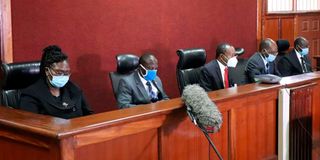Judicial populism is Hustler Nation’s newest strategy to defeat reforms

(From Left) Lady Justice Teresia Matheka, Justices George Odunga, Joel Ngugi (presiding), Jairus Ngaah and Chacha Mwita at the High Court in Nairobi on May 13, 2021, where they delivered the judgement on eight consolidated petitions challenging the BBI push.
What you need to know:
- The Judiciary is the new frontier in ‘Hustler ideology’, a form of politics that drives a sharp wedge between the rich and the poor.
- This week’s High Court ruling is also an assault on county assemblies, the Senate and the National Assembly, which voted for the document.
We live in the age of populism. Defined as a political approach that strives to appeal to Wanjiku (ordinary people) who feel their concerns are disregarded by established elite groups, populism pervades every sector of our society.
On Thursday, May 13, 2021, a five-judge bench of the High Court delivered a controversial 321-page judgment that ruled Kenya’s constitutional reform bid through the Constitution of Kenya Amendment Bill (2020) as illegal. This has ushered in a phenomenon known as judicial populism.
Also known as ‘popular constitutionalism’, judicial populism is not only a reaction to the perceived elitist bias in the legal system, it also refers to court actions that reflect public sentiment or those aimed at garnering public support for the judicial institution. In its extremist form, judicial populism claims to represent the interests of the people against a corrupt elite.
The Judiciary is the new frontier in ‘Hustler ideology’, a form of politics that drives a sharp wedge between the rich and the poor in Kenya’s increasingly unequal society.
Scholarship has shown that judicial populism undermines stability and the quality of democracy. In Pakistan, the Supreme Court has routinely disqualified prime ministers. As a result, no elected prime minister completed their constitutional tenure between 1947 and 2018! Here, judges have reframed the Supreme Court as the “People’s Supreme Court” to gain popularity with the public. The Supreme Court has abused its high popularity rate to weaken other democratic institutions and taken a more openly partisan stance that erodes democracy.
Judicial populism is an assault on judicial professionalism based on the logic that knowledge, rationality and ethics form the cornerstones of professional legal practice. Judges should avoid conflict of interest that comes with meddling in partisan politics, or allowing personal whims and views to guide their decisions.
In Kenya, a new bout of judicial populism emerged after the 2010 Constitution, hoisted on Baron Montesquieu’s classic doctrine of separation of power between the executive, legislature and judiciary as the best safeguard of political liberty against tyranny.
Linda Katiba initiative
This activism has set Kenya’s Judiciary upon the other arms of government, leading to perennial clashes and undermining consensus and smooth running of the government.
This week’s High Court ruling is also an assault on county assemblies, the Senate and the National Assembly, which voted for the document.
In a gist, “the BBI Consolidated Judgment – David Ndii & Others v. Attorney General & Others, Petition No. E282 of 2020” signifies the strident weaponisation of the Judiciary ahead of the 2022 elections. By intervening in a partisan fashion and stopping the Independent and Electoral Boundaries Commission (IEBC) from proceeding with the Building Bridges Initiative (BBI) Bill, the High Court has tragically thrust partisan politics and intra-elite wars into the courts.
Undoubtedly, the ruling is a masterstroke by the Hustler Nation. For starters, the petitioners are squarely in Deputy President William Ruto’s Tangatanga axis and allied political coalitions, lobbies and civil society activists coalesced around the Linda Katiba initiative.
The petitioner, Mr David Mwangi Ndii, is officially a Ruto strategist. Conspicuously, the ruling was immediately followed by a well-coordinated media campaign by Tangatanga wonks. Mr John Githongo, a key figure in the anti-BBI Linda Katiba Initiative, went to Al-Jazeera, charging that the constitutional amendments are partly designed to tame Ruto’s political ambitions and “some of these alignments are to sideline him”.
Mr Ndindi Nyoro, a virulently pro-Ruto parliamentarian, told Citizen TV that “I don’t think we have a constitutional problem in Kenya… The biggest problem in Kenya is an economic problem.” And Tangatanga mandarins wrote prolifically accusing BBI of seeking to overhaul “Kenya’s very progressive 2010 Constitution”.
BBI’s popular endorsement
The ruling made two conclusions with far-reaching implications for Kenyatta. First, “the constitutional amendment Bill is an initiative of the President and he has no mandate under the law to initiate any constitutional changes through popular initiative.” This renders the BBI process illegal. Second, “civil proceedings can be instituted against the President for violating the Constitution.
“The President cannot be both player and umpire in the same match,” said Justice Jairus Ngaah.
However, the ruling marks a clash of two doctrines that the Court of Appeal must reconcile.
It was based on the “Basic Structure Doctrine”, which limits power to amend the 2010 Constitution, arguing it can only be initiated by Parliament through a parliamentary initiative (Article 256) or through a Popular Initiative (Article 257).
The bench erred by trashing BBI’s popular endorsement by millions of signatures, a vote in a majority of county assemblies and overwhelming endorsement by the Senate and the National Assembly in a televised voting process.
Moreover, the judges ignored the long-established doctrine of necessity, which allows administrative authority to undertake constitutional and even extra-constitutional actions to restore order, stability and secure the future of nations. In this regard, the constitutional reforms envisaged by the Constitution of Kenya Amendment Bill (2020) seek to promote the sharing of power among competing ethnic groups to end cycles election violence that undermine development.
However, this is not the end of the road for the BBI Bill. Judicial populism will meet its waterloo in the Court of Appeal and the Supreme Court.
Professor Peter Kagwanja is a former Government Adviser and currently Chief Executive of the Africa Policy Institute.





